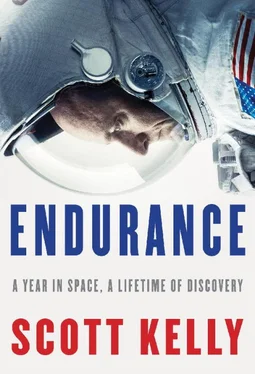I celebrated my first Thanksgiving on the space station shortly before taking over as commander of ISS for the first time. The next day, Shannon, Doug, and Fyodor departed for Earth, leaving behind Sasha, Oleg, and me.
A few weeks later, the new crew arrived. American astronaut Cady Coleman was a retired colonel in the U.S. Air Force and held a Ph.D. in chemistry, and, I came to learn, played the flute. Some people who knew Cady and me thought that we might not click as crewmates, or that I might kill her, because we came from such different backgrounds—the fighter pilot (me) and the scientist (Cady). In fact, Cady and I became great friends and she was a great crew member, even though I was never able to get her to go to bed on time. Sometimes I would get up to use the bathroom at three a.m. on a work night and find her playing her flute in the Cupola. Cady taught me how to be more in touch with my feelings and those of the people we worked with on the ground. She also helped me see the value of reaching out more to the public, letting people share the excitement of what we were doing in space. This would turn out to be enormously helpful on my yearlong mission.
The Italian astronaut Paolo Nespoli, a talented engineer with a great sense of humor, was the third member of the new crew. Paolo is really tall—too tall to fit into the Soyuz, in fact, and the European Space Agency had to pay the Russians to modify the seat, setting it at a steeper angle, in order to fit him into the capsule.
The Soyuz commander was Dima, who had been on the Expedition 5 backup crew with me and with whom I had done survival training a decade ago. This was his first spaceflight. Back when Dima and I were assigned to the same backup crew, he had argued that he should be commander of ISS because he was the commander of the Soyuz and a military officer. Sasha Kaleri, with his extensive experience in space, was much better qualified to command but was not a military officer. Dima was so convinced that he had been wronged that he wrote two strongly worded letters to his management saying that Sasha wasn’t performing up to par and should be removed from the crew. This incredible breach of protocol meant that Dima was not assigned to a flight for many years, despite his superior technical skills.
I had heard about crew members not getting along during spaceflights, but I had never personally experienced it myself—until now. I floated down to the Russian segment one day to ask about something, and while I was there Dima asked for my help with a piece of Russian hardware he was struggling to fix—the Russian Elektron, their device for producing oxygen from water. That wouldn’t have seemed unusual, but he asked me with Sasha floating in the vicinity. Sasha offered to help, to his credit, but Dima pretended not to hear him. I couldn’t imagine what it was like working, eating, and sleeping on top of each other for four months with that much tension between them. Their lack of communication made their work harder and could have cost them their lives—and, potentially, ours too—in an emergency.
After I had been in space for a few months, the press was reporting that Sasha Kaleri had brought with him a Quran that had been given to him by Iran. The rumor was that the Quran was a symbolic response to a recent desecration of Qurans in the United States on the anniversary of the 9/11 terrorist attacks. The ISS program manager wanted to know if it was true. When the chief astronaut asked me about it, I said I didn’t care what books crew members brought on board with them, and I was surprised that NASA would take an interest in such details. I said I wasn’t going to ask anyone about his or her private belongings, and I thought that would be the end of it. But soon after, I heard directly from the space station program manager: I was told in no uncertain terms that I was expected to find out whether Sasha had brought a Quran on board.
Usually I would push back against a request from the ground only once, and if they persisted, I would do it their way unless it was a safety issue. This was easier than having a showdown over every small disagreement and would preserve my sanity and energy for when it was really needed. But in this case, I still felt strongly that I shouldn’t acquiesce.
The next day, I floated over to the Russian segment and found Sasha in the confined space of the Russian airlock, working on one of their spacesuits.
“Hey, Sasha,” I said. “I’m supposed to ask you something, but I don’t personally care what the answer is.”
“Okay,” Sasha said.
“I’m supposed to ask you whether there’s an Iranian Quran on board the station.”
Sasha thought for a moment. “That’s none of your business,” he said agreeably.
“Got it,” I responded. “Take it easy.” I floated back to the U.S. segment and passed his answer on to my management. That was the last I heard of it.
—
JANUARY 8, 2011, WAS a bright sunny day in Tucson, Arizona, but on the space station, the weather was the same as always, and I was fixing the toilet. I had taken it apart and organized the pieces around me so they wouldn’t float away, and now I would not do anything else until I finished the job. We can use the toilet in the Russian segment if necessary, but it’s far away, especially in the middle of the night, and puts unnecessary stress on their resources. The toilet is one of the pieces of equipment that gets a great deal of our attention—if both toilets break we could use the Soyuz toilet, but it wouldn’t last long. Then we would have to abandon ship. If we were on our way to Mars and the toilet broke and we couldn’t fix it, we would be dead.
I was so involved in the work that I didn’t notice the TV feed being cut. We lost our signal pretty routinely, whenever the space station went out of the line of sight between our antennas and the communication satellites, so I didn’t think it was a big deal. Then a call came from the ground.
Mission control told me that the chief of the Astronaut Office, Peggy Whitson, needed to talk to me and would be calling on a private line in five minutes. I had no idea why, but I knew the reason wouldn’t be anything good.
Five minutes is a long time to think about what emergency might have occurred on the ground. Maybe my grandmother had died. Maybe one of my daughters had been hurt. I didn’t make any connection between the blank TV screen and the phone call—NASA had deliberately cut the feed to spare me learning bad news.
Before leaving for this mission, I had decided that Mark should act as my proxy in cases of emergency. He knew me better than anyone, and I trusted him to decide what I should hear and when, whether it should come through him or someone else, like a flight surgeon or another astronaut. He knew that in a crisis I would likely want to have all the information up front as soon as possible.
Peggy came on the line. “I don’t know how to tell you this,” she said, “so I’m just going to tell you. Your sister-in-law, Gabby, was shot.”
I was stunned. This was such a shocking thing to hear, it seemed surreal. Peggy said she didn’t have any more information, and I told her I wanted to know any news as it came in, that she shouldn’t keep secrets to spare me. Even if the information was unconfirmed or incomplete, I still wanted to know.
When I got off the line, I told Cady and Paolo what had happened, and then I told the cosmonauts. I tried to assure everyone I was going to be okay, but I also told them I was going to need some time and that I was going to spend most of it on the phone. They were shocked and upset as well and of course gave me the room I needed. Though I was hesitant to turn over this crucial job of fixing the toilet to Cady and Paolo, I had no choice but to trust them.
Читать дальше












